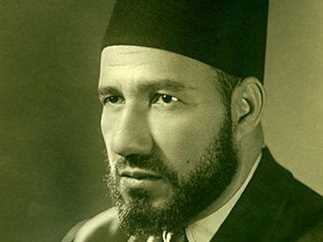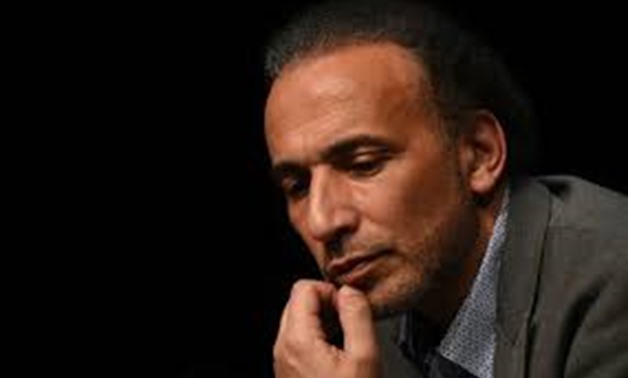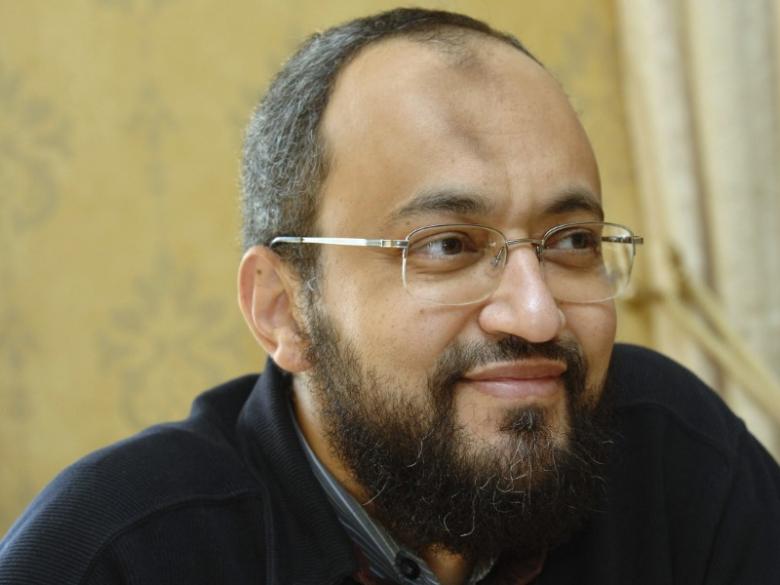With his soft-spoken voice, he often engaged in lengthy discussions with visitors about Muslim thought. At times, he would walk up to one of the many bookshelves in his apartment and suddenly pull out a text he thought was a must-read.
Despite his advanced age, his concentration rarely failed him in such conversations.
Last week, Banna died at the age of 92, leaving behind a controversial legacy. For some, he will be commemorated as a high-profile Muslim reformer. For many, he will remain dismissed as a pretentious, malicious writer who sought to undermine the fundamentals of the Muslim faith.
Banna was born in 1920 in the Delta province of Beheira. He grew up in a family that 14 years earlier had given birth to one of the most influential figures in the modern history of the Arab world. Hassan al-Banna, the founder of the Muslim Brotherhood, who spearheaded Islamism in the region, was his elder brother.
Nevertheless, the younger Banna proved to be his antithesis. While Hassan took it upon himself to spread some of the strictest interpretations of Islam through his hierarchical, socio-religious organization, Gamal rebelled against a colossal body of Islamic literature and promoted a quite secular reading of Islam.
The deceased writer was a self-made Muslim jurist; he held no diploma from any accredited religious institution. While his brother, Hassan, received a religious education from his early years until he graduated from Dar al-‘ulum, Gamal was sent to a secular school until he dropped out of high school. Later on, he studied commerce at an intermediate school.
As a teenager, Banna said he had immersed himself in the Muslim heritage. Over the course of 50 years, Banna once said, he had delved in classical works on Muslim history, jurisprudence and hermeneutics. Looking back on his learning, though, Banna always regretted not having memorized the Quran as a child.
A feminist at heart
Women’s issues constituted one of the pillars of Banna’s work. He dedicated at least two of his books to emancipating Muslim women and girls, and challenging religious dogmas that tightened men’s grip over women’s bodies and minds.
In his oeuvre, “The Muslim Woman between the Emancipation of the Quran and Jurist-made Constraints,” Banna drops a plethora of bombshells by arguing that the Quran neither obliges women to wear the hijab nor denies them the right to run for the highest posts, including the presidency.
To substantiate his propositions, Banna had engaged with the verses and the Prophet’s sayings that were put forward by Muslim jurists to prove that women should cover up, and to disqualify them for leading positions. The late author had offered a different interpretation of the verse on the hijab, and refuted the authenticity of the Prophet’s saying that asks women to conceal all body parts expect their faces.
He also dismissed as fabricated another allegedly prophetic saying forecasting the failure of nations that accept women’s leadership. For Banna, this inferior status of Muslim women, as coined in mainstream Muslim jurisprudence, is the outcome of a misogynistic Arab culture that had nothing to do with true Islam.
Flexible Quran and fabricated Sunna
In his works, Banna also refuted the canonical rule of naskh employed in interpreting the Quran. According to this rule, some early Quranic verses were abrogated by other verses that were revealed to Prophet Mohamed later on. By virtue of this rule, mainstream scholars hold that verses about jihad and war against non-Muslims overrule others promoting tolerance.
By using the same jurisprudential language, Banna proved that neither the Quran nor the Prophet’s authenticated sayings supported this rule. He argued that this rule evolved as the outcome of a misunderstanding of the Quran. Early jurists thought that the text seemed inconsistent with verses, contradicting each other.
Hence, they designed the naskh rule to make up for this alleged self-contradiction. However, Banna did not see contradictory content as a flaw that needed amending. On the contrary, he perceived it as a sign of the Quran’s flexibility and adaptability to different situations.
He wrote: “The circumstances in one society may differ from those in another, and one epoch may differ from a previous one …”
In 2004, Banna elicited a stir of fury with his statements about the Prophet’s Sunna. He had contended that all the Prophet’s sayings need to be revised, refuting the authenticity of many on the grounds that their narrators’ integrity was not known, or that the content itself made no sense and contradicted the essence of Islam.
In response, conservatives accused him of denying the Sunna altogether and questioned his faith. Rather than engaging critically with Banna’s propositions, the incident was a perfect occasion for some Al-Azhar scholars to react condescendingly and stress that he had no academic credentials to broach such issues.
In fact, the dismissal was mutual. Banna never thought highly of Al-Azhar, which is widely viewed as the most prestigious Sunni institution in the Muslim world. He argued that no Al-Azhar scholar had made a significant intellectual contribution to Muslim thought except Mohamed Abdo.
Yet Abdo had to transcend Al-Azhar in order to stand out, according to Banna. The latter often invoked Abdo’s famous saying that it had taken him too long to “clear his mind from the garbage” he was taught at Al-Azhar.
A more familiar methodology
Unlike many contemporary reformists, Banna’s writings did not employ a sophisticated extra-religious discourse, drawing heavily on Western philosophy and analytical tools. On the contrary, his reform method was based, to a great extent, on the same language employed by mainstream jurists and comprehended by the majority of Muslims.
While reformers such as Nasr Hamid Abu Zaid and Mohamed Arkoun sought to develop a postmodern holistic methodology that assumes the existence of many forms of truths and hence implies the sacred text could have a variety of meanings, Banna devoted most of his writings to deconstructing particular fatwas and beliefs that influenced Muslims’ daily lives. In doing so, he went back to the same Muslim references, digging out unspoken Prophet’s sayings or incidents that challenged mainstream Islamic discourse.
The familiarity of his language allowed him to engage with a larger audience in Egyptian society. He was a regular guest on several talk shows and his columns also appeared in many newspapers.
Yet the relative simplicity of his discourse did not mean he had fewer detractors than Abu Zaid, who was forced into self-exile due to his views on religion. In fact, Banna was often called names for his unorthodox views.
In 2011, he made headlines with a fatwa expressing lenience on physical contact between men and women. Appearing on a TV show, the anchor attacked him for the edict and accused him of being a pimp. A few years earlier, Banna passed a similarly incendiary fatwa, arguing that Muslims could smoke cigarettes while fasting.
On a political level, Banna’s writings preached rebellion against autocratic rule. He vehemently criticized mainstream Muslim political thought for its promotion of submissiveness to rulers on the grounds that revolt could lead to fitna, the Arabic word for sedition.
Banna argued that many of the Prophet Mohamed’s sayings invoked to dissuade Muslims from challenging their leaders were falsified under the rule of dictatorial Muslim monarchs of the Umayyad and Abbassid times.
Fighting Islamism
Banna’s passing comes at a time when his staunchest detractors are stretching their hegemony over the state and society. The Islamist agenda, which Banna had long fought against, is prevailing for the first time, with the ascent of the Muslim Brotherhood to power and the emergence of Salafis as key political players in post-Hosni Mubarak Egypt.
While his brother spent his life contemplating this moment and seeking to establish a utopian religious state, Banna’s book “Islam is a Religion and an Ummah, not a Religion and a State,” refutes classical Islamist claims about the indispensability of an Islamic state. For Islamists, Muslims have a religious obligation to establish an Islamic state where God’s Sharia shall be implemented.
Banna challenged such an obligation by arguing that Islam could spread in Mecca during the Prophet’s time while there was still no Islamic state and when the majority of Muslims were persecuted by non-believers.
He went on to contend that mixing religion with power threatens the faith itself — a proposition that might resonate today with many Egyptians who feel disillusioned with the new political elite and its banner that “Islam is the solution.”
The Brotherhood’s political ineptness, coupled with its attempts to reproduce Mubarak’s autocratic regime, has made many people question the essence as well as the integrity of the Islamist project altogether.
It remains to be seen whether such a disappointment with the Islamists, who succeeded in spreading their control over society decades before they took over the state, will push more people to seek different interpretations of Islam and hence explore the works of reformers like Banna.




